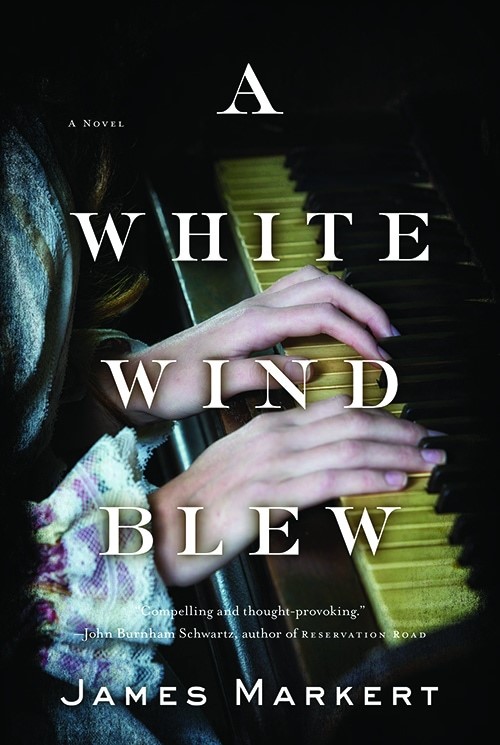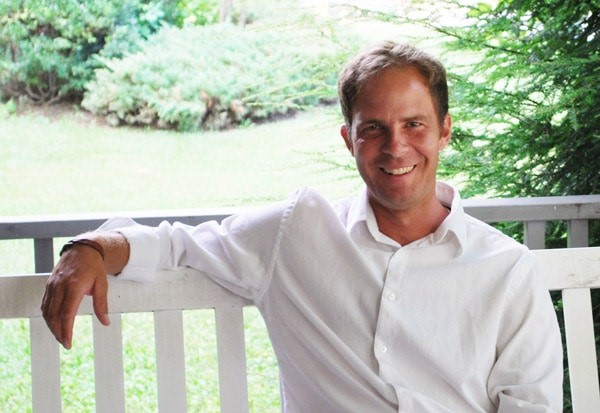
A warmest welcome to all of our readers today as we discuss our MomAdvice Book Club pick for the month of March. I am particularly honored to have James Markert sharing his own thoughts on his book with us and I hope you will find his answers as fascinating as I have!
Tuberculosis and how this illness affects its patients, and those that love them, are often the central focus of this book. After I finished reading this and then reading the historical notes about Waverly Place, I immediately went in search of more information about the illness and the backdrop for this book. Although the book goes into great detail of symptoms of TB and what the patients experience, it does not delve into why people have it because, in this time period of the book, people do not know how to cure it or why it lies dormant in some, while killing others.
Tuberculosis, is a common, and in many cases lethal, infectious disease caused by various strains of mycobacteria, usually Mycobacterium tuberculosis. It typically attacks the lungs, but can also affect other parts of the body. It is spread through the air when people who have an active TB infection cough, sneeze, or otherwise transmit respiratory fluids through the air. Most infections are asymptomatic and latent, but about one in ten latent infections eventually progresses to active disease which, if left untreated, kills more than 50% of those so infected.
As we are able to read in this book, treatment for progressive cases often included removing ribs to help the lungs and all patients were encouraged to get as much fresh air as possible, even in wintery weather conditions, because fresh air was believed to help cure this illness.
Delving into the book, we have an unlikely band of friends that have gathered together to create an orchestra who are working together to perform a concert. I love how the author pulls together these unlikely people and then, oftentimes, paints a very different portrait of what we expect them to be like and then tells us the true story of who they are when we dive further into the book.
Rose’s death, for example, takes me completely by surprise as I believed it was one way and it was not. McVain, who begins the novel as an unlikeable bully, later delves into his story of his true wartime injury and the unlikely love he discovered. Herman, when given a little love and attention from Susannah, steals the show with his beautiful voice. And, one of the most pivotal moments for Wolfgang, is when he finds out the death of his father is very different than his childhood interpretation of what really happened.
I loved this book from start to finish. Although the book is filled with death and disease, it offered a surprising amount of hopefulness in it. There is so much love and beauty as the patients join forces to complete and perform the requiem and the beauty of these unlikely friendships and loved is solidified because they are all battling this same fight.

James Markert is a debut novelist and screenwriter, which is why his writing feels oh-so-cinematic. James lives in Louisville, Kentucky with his wife and two children. He has a history degree from the University of Louisville, where, in his senior year, he was honored as the school’s most outstanding history major. He won an IPPY Award for The Requiem Rose, published by Butler Books.
With Requiem’s local success, James was signed by Writers House Literary Agency in New York, and the book was sold to Sourcebooks, Landmark in January 2012. Rewritten and retitled, it became A White Wind Blew. James is currently working on his next novel, The Strange Case of Isaac Crawley, a story that takes place in the late nineteenth century and involves the theater scene, a lunatic asylum, and the theatrical version of Dr. Jekyll and Mr. Hyde…and possibly a few gaslights, cobblestones, and an eerie fog.
He runs his own blog called Markert Ink where you can read about some of his thoughts on books and writing. I know you will want to become a fan after you read this one and you can follow James on Twitter!
James has graciously answered all of our questions about the setting, inspiration for the book, and who inspires him in his own writing. I am particularly excited for you to read his thoughts on adapting A White Wind Blew as a screenplay!

Upon reading the historical notes about Waverly Place, we find that this sanitarium is considered one of the most haunted places in the United States. Why did you decide to set a book here and do you think you hint at the darkness of Waverly Hills (the Death Tunnel and the suicide scene in the book) in nod of this history you discovered?
I grew up only a few miles from Waverly Hills and was always fascinated because of the legends and stories of ghosts there, but when I visited a few years ago, it was the history, the wooded surroundings, and grand architecture that drew me in. History seeped from every room. I went in wanting to come out with a story idea, something scary, actually, but instead, while I stood out on the fourth floor solarium porch, listening to the wind and watching the trees sway, I thought to myself: What if this place really is haunted? What if I am surrounded by ghosts? What is their story? I imagined the sound of a violin, and, coupled with the fact that they had no cure back then, the story of musical medicine took root. Waverly is known around the world as a haunted building, I thought the real flesh and blood inhabitants, the people who lived and died there, deserved to have a story told that revealed their fight and struggles. But in doing this, I also wanted to incorporate some of the legends, namely the nurse suicide and the body chute. And Big 15 was also taken from an actual man who worked there, doing the same job, and his name was Big 14 because of the size of his feet!
The whole book really centers on music and music therapy for the patients. What type of research did you need to do to prepare for this portion of the book?
My sister-in-law is a music therapist, so I did consult her. My sister is a pianist, and I think her constant practicing, although it annoyed me and my brothers as kids, really sunk in with me and inspired this book later in life. TB had no cure, and I feel that music can be really healing. I did a little research online, and have since become involved with the National Music Therapy Association, but since music therapy was not really a “field” during the time of the story, I intentionally didn’t research that much from current music therapy practices because I wanted it to come off as something new for Wolfgang as well, something unpolished and evolving.
When Wolfgang witnesses the horrific death of his father, he always blames his mother & never forges a relationship with her. When she comes to visit to take one of the instruments and Wolfgang discovers the true reason for his death, he invites her to the concert. Is there a reason why you did not write her into the concert scene at the end?
I did consider writing her into the concert, but ultimately decided not to. White Wind is a moving story. It can be sad and funny in parts, and make you really think in others, and, although I wanted the concert to be uplifting on many levels, I didn’t want to wrap everything up too nicely for Wolfgang. It didn’t want it to seem like the concert solved everything for him, so I decided to leave her at home.
Who are some of your favorite authors or favorite books that have influenced you as a writer?
I grew up a huge fan of Stephen King. I was not a reader until sophomore year of high school. My English teacher told out class, “Ok, I know half of you won’t want to read the “classics”, and those who do probably won’t fully enjoy it, so we’re reading Stephen King novels all year.” And we did, but not his scarier stories. We read Shawshank Redemption, The Green Mile, Stand by Me, etc… and we had great discussions because all the kids read them. That’s when I fell in love with books, and I then devoured every Stephen King book available. From there I moved on to Dean Koontz, and those two authors heavily influenced by first few unpublished novels. The way I write now, with historical fiction, I’d say my biggest influences are Ken Follett, Pat Conroy, Caleb Carr, and John Irving. I love how John Irving develops his characters. As far as suspense, I’m a big fan of Greg Iles. George RR Martin’s Game of Thrones books are probably my favorite to read at the moment. Pillars of the Earth is my favorite book. Shadow of the Wind, by Carlos Ruiz Zafron is also one of my favorites. I could read Pat Conroy and John Irving all day long.
The ending is left open to interpretation by the reader. As the writer, do you see Wolfgang choosing the priesthood or do you picture him continuing his work at Waverly Hills?
I go back and forth on this, which is only part of the reason why I did it. Whenever someone asks me why, I always tell them that I fell asleep halfway through that sentence. But the truth is, when I got to that part, and I honestly didn’t have an answer when I got there, I thought to myself that it didn’t matter as much to me. Wolfgang had already begun his healing by then and I didn’t want to lead him one way or another. The concept of faith is big in the book, but I don’t try to answer it. The question: Where do we go when we die? Is also another big part of the book that I intentionally don’t try to answer either. Faith is an open-ended question with many answers that lead to many other questions, so that is the main reason I ended it that way. Like faith, I wanted the reader to take that on themselves. I wanted to let the reader take Wolfgang where they thought he should go, and no matter, their answer would be right.
As a screenwriter, many aspects of this book feel like they would lend itself to a movie. Are you planning to develop this for the screen?
YES!!! I actually wrote the screenplay for this story before I wrote the novel because screenplays are quicker to write and the story, with the music, was so cinematic. I’ve always envisioned it as a movie. After I finish my next book in a few weeks I plan on rewriting the screenplay for A White Wind Blew. I’ve recently opened some doors with another movie I’ve written that could make A White Wind Blew a bigger possibility in the future. It will be a movie someday, even if I have to produce it myself!
Who would be part of your “dream cast,” for playing these roles?
I don’t always do this with books I write, but I did with this one. I had three actors clearly in mind when I wrote it. For Wolfgang I imagined Joaquin Phoenix. For Susannah I imagined Amy Adams. And sadly, for McVain, I had imagined Phillip Seymour Hofmann. But my second choice for McVain would be Russell Crowe. And for Rose I’d always had Audrey Tautou in mind. She plays Mathilde in the French film, A Very Long Engagement, and she’s also in The Da Vinci Code.
Thank You so much to all the readers in your book club for reading my debut novel, and for the insightful questions. Please feel free to tell many other books clubs about it!
Best wishes,
James Markert
What did you think of A White Wind Blew? Can’t you just picture this as a movie? It is cinematic storytelling at it’s best. Share your thoughts on our book club pick below and offer recommendations for what you might like to see on our list in the upcoming year!
Our next book club pick will be announced on March 28th- this is a big departure from our past three historical fiction books! In the meantime, catch up on what is happening this year and explore our past book club selections here!
This post does contain affiliate links!
Pin It